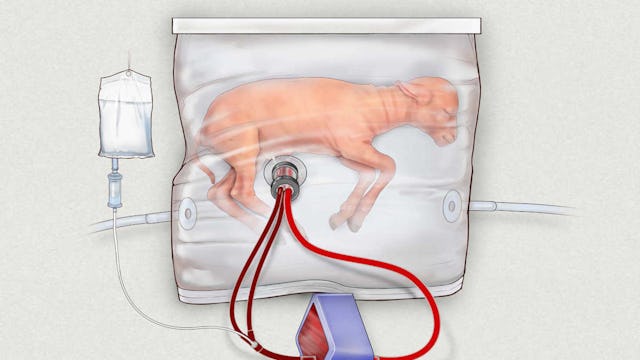This Artificial Womb Could Someday Save Severely Premature Babies

Scientists develop artificial womb, but raise ethical questions
In the United States, about one in every nine babies is born prematurely (before 37 weeks gestation.) That number — about 450,000 babies per year — is the highest of any industrialized nation. And though we have vastly improved survival rates for babies born between 22 and 28 weeks, the vast majority of those babies are at greater risk for everything from cerebral palsy to blindness and deafness. But a new study published in the journal Nature Communications may offer a way to save the lives of extremely premature babies and allow them to develop normally.
In the study, which was published yesterday, researchers created an artificial womb that allowed fetal lambs to develop normally for about a month. This is a huge step in what could end up being a lifesaver for babies born between 23 and 25 weeks (the stage most comparable to the 107-day-old lamb fetuses used in the study). The artificial womb is, essentially, a plastic bag with a nozzle attached to it. It doesn’t look like much, but researchers went to incredible lengths to try to recreate the fetal environment. “What we tried to do is develop a system that mimics the environment of the womb as closely as possible…The whole idea is to support normal development; to re-create everything that the mother does in every way that we can to support normal fetal development and maturation,” lead researcher Alan Flake told NPR.
The Biobag is a closed, sterile environment filled with synthetic amniotic fluid. A cannula was attached to the lamb’s umbilical cord and then to a machine that acted like a placenta, providing the fetus with nutrition and oxygen and removing carbon dioxide. The fetus and Biobag were kept in a “dark, warm room where researchers [could] play the sounds of the mother’s heart for the lamb fetus and monitor the fetus with ultrasound.” Researchers found that for four weeks the lambs had normal brain, lung, and organ development and that once removed from the bag and put on ventilators, they were comparable to lambs of the same fetal age who had been removed by caesarean section.
Scientists hope to test the Biobag on very premature human babies within the next 3-5 years. Though any tests on human subjects — let alone babies — is fraught with ethical concerns, the idea here is that, since the survival rate is already so dismal for babies born that early, the Biobag might at least give them a chance. As it says in the study, “We…feel that the advantages far outweigh the disadvantages of exposure of the fetus to the conventional care imposed on the critically preterm infant in the neonatal intensive care unit environment…Our goal is not to extend the current limits of viability, but rather to offer the potential for improved outcomes for those infants who are already being routinely resuscitated and cared for in neonatal intensive care units.”
Obviously, this whole thing has a creepy-growing-people-in-a-bag-and-next-we-have-monsters feel to it, and there are some very important concerns that go along with this kind of technology. First and foremost, there is the issue that in testing, there is no guarantee of success and some babies would die. Another concern put forth by bioethicist Dena Davis in the NPR article is that of the quality of life for the surviving babies: “If it’s a question of a baby dying versus a baby being born who then needs to live its entire life in an institution, then I don’t think that’s better. Some parents might think that’s better, but many would not,” she said.
There’s also the possible immoral uses of the technology, such as forcing women who want abortions to grow their babies in Biobags instead, or, as bioethicist Scott Geland theorized to NPR, “employers could also require female employees to use artificial wombs to avoid maternity leave…Insurers could require use of the device to avoid costly complicated pregnancies and deliveries.”
Are you shuddering? We’re shuddering.
The artificial womb could be the beginning of something miraculous — we could save thousands of babies who otherwise wouldn’t have a chance, and that may very well be worth the risk of more sinister uses. With any technological advance, however, there is always the possibility that it will get misused. Mainly because we are all idiots hell-bent on our own destruction…but we digress. Hopefully, as progress on the Biobag continues, those ethical concerns will be thought out and plans will be put in place to prevent such abuses from occurring. And we can focus instead on the little lives that will be saved.